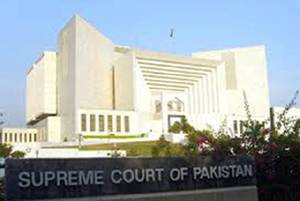ISLAMABAD – The Supreme Court on Wednesday directed the Sindh government to form a three-member committee to review the eligibility of 166 non-teaching college staff appointed in the Sukkur region, following long-standing disputes over the legality of their recruitment.
The directive was issued by a three-judge bench, headed by Justice Muhammad Ali Mazhar, during a hearing of appeals challenging the Sindh Service Tribunal’s decision to uphold the dismissal of the employees.
According to the court directive, the Secretary of College Education shall forward a formal request to the Services, General Administration and Coordination Department for the formation of a committee. The committee shall comprise the Director General of College Education, the Additional Secretary of College Education, and the Deputy Secretary of the Services, General Administration and Coordination Department. Upon receiving the request, the concerned department is required to notify the committee within ten days.
The committee has been tasked with issuing notices to the petitioners, allowing them to submit documents related to their recruitment. These will serve as evidence to assess whether due process was followed during their appointments.
The court also noted that the committee should examine whether the petitioners are included among the 166 individuals listed in the report compiled by the Regional Director (Colleges), Sukkur. This report had been authenticated by a prior committee which included Professor Abdul Razzak Baloch, Principal, Government Islamia Science College, Sukkur; Professor Syed Lutuf Ali Shah, Director Finance, Directorate Colleges, Sukkur; and Professor Mukhtiar Ahmed Mahar, Assistant Professor, Government Education College, Sukkur. The report was dated 2 February 2016.
The bench observed that if the petitioners are found to be part of the verified list, they shall be allowed to rejoin service after the verification of their documents. The entire exercise is to be completed within two months from the date the committee receives the court order. The court emphasised that the process should be carried out independently and without being influenced by the previous decision of the Service Tribunal.
The dispute started in July 2011 when the Sindh College Education Department advertised 289 non-teaching posts (BPS-01 to BPS-12) in Sukkur. The petitioners claim they were selected on merit, received offer letters, joined service, and were issued service books.
However, their salaries were withheld, prompting them to file a constitutional petition in the Sindh High Court in 2012. A list submitted by the department on 28 November 2014 acknowledged 166 appointments. On 16 December 2014, the High Court, through a consent order, directed the release of salaries to those employees.
That order was later overturned by the Supreme Court, which remanded the matter to the Sindh Service Tribunal. On 13 November 2015, the tribunal dismissed the petitioners’ appeals.
Meanwhile, during adjudication, the tribunal had framed multiple questions, and the Education Department had constituted a separate committee to examine the legality of appointments. This committee reviewed the cases of 177 individuals, including the petitioners, and concluded in its report dated 2 February 2016 that the petitioners were not at fault. Rather, the responsibility was placed on the former Director Colleges, Sukkur.
Despite this finding, the department issued show-cause notices to all appointees and removed them from service after brief hearings. The affected employees filed departmental appeals, which were also dismissed. Thereafter, the petitioners approached the Sindh Service Tribunal, where their appeals were once again rejected. The petitioners then challenged the tribunal’s decision in the Supreme Court.
The case will now proceed under the apex court’s fresh directions, with the newly constituted committee to determine the fate of the 166 staff members.
